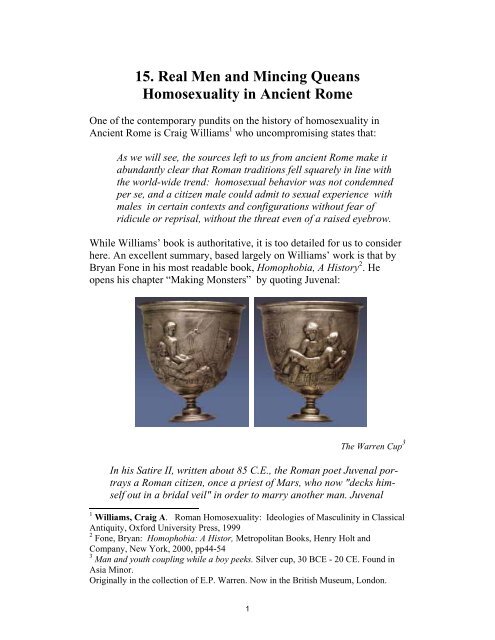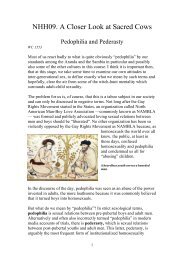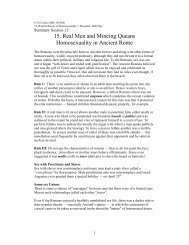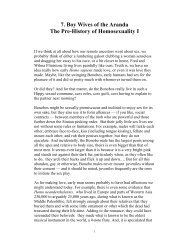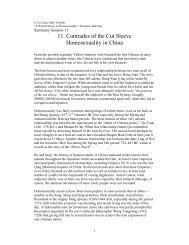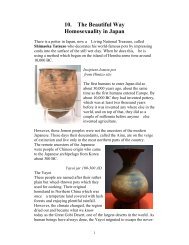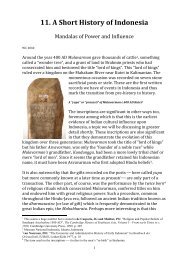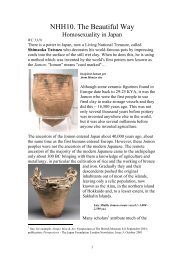15. Real Men and Mincing Queans Homosexuality in Ancient Rome
15. Real Men and Mincing Queans Homosexuality in Ancient Rome
15. Real Men and Mincing Queans Homosexuality in Ancient Rome
Create successful ePaper yourself
Turn your PDF publications into a flip-book with our unique Google optimized e-Paper software.
<strong>15.</strong> <strong>Real</strong> <strong>Men</strong> <strong>and</strong> <strong>M<strong>in</strong>c<strong>in</strong>g</strong> <strong>Queans</strong><br />
<strong>Homosexuality</strong> <strong>in</strong> <strong>Ancient</strong> <strong>Rome</strong><br />
One of the contemporary pundits on the history of homosexuality <strong>in</strong><br />
<strong>Ancient</strong> <strong>Rome</strong> is Craig Williams 1 who uncompromis<strong>in</strong>g states that:<br />
As we will see, the sources left to us from ancient <strong>Rome</strong> make it<br />
abundantly clear that Roman traditions fell squarely <strong>in</strong> l<strong>in</strong>e with<br />
the world-wide trend: homosexual behavior was not condemned<br />
per se, <strong>and</strong> a citizen male could admit to sexual experience with<br />
males <strong>in</strong> certa<strong>in</strong> contexts <strong>and</strong> configurations without fear of<br />
ridicule or reprisal, without the threat even of a raised eyebrow.<br />
While Williams’ book is authoritative, it is too detailed for us to consider<br />
here. An excellent summary, based largely on Williams’ work is that by<br />
Bryan Fone <strong>in</strong> his most readable book, Homophobia, A History 2 . He<br />
opens his chapter “Mak<strong>in</strong>g Monsters” by quot<strong>in</strong>g Juvenal:<br />
The Warren Cup 3<br />
In his Satire II, written about 85 C.E., the Roman poet Juvenal portrays<br />
a Roman citizen, once a priest of Mars, who now "decks himself<br />
out <strong>in</strong> a bridal veil" <strong>in</strong> order to marry another man. Juvenal<br />
1 Williams, Craig A. Roman <strong>Homosexuality</strong>: Ideologies of Mascul<strong>in</strong>ity <strong>in</strong> Classical<br />
Antiquity, Oxford University Press, 1999<br />
2 Fone, Bryan: Homophobia: A Histor, Metropolitan Books, Henry Holt <strong>and</strong><br />
Company, New York, 2000, pp44-54<br />
3 Man <strong>and</strong> youth coupl<strong>in</strong>g while a boy peeks. Silver cup, 30 BCE - 20 CE. Found <strong>in</strong><br />
Asia M<strong>in</strong>or.<br />
Orig<strong>in</strong>ally <strong>in</strong> the collection of E.P. Warren. Now <strong>in</strong> the British Museum, London.<br />
1
comments, "horreres maioraque monstra putares": "you may shudder<br />
<strong>and</strong> consider such men even greater freaks" — greater, that is, even<br />
than such evil omens as women giv<strong>in</strong>g birth to calves, or cows to<br />
lambs. Invok<strong>in</strong>g the shades of Roman ancestors, Juvenal argues that<br />
the presence <strong>in</strong> society of such men bodes no good for the Roman<br />
people; <strong>in</strong>deed, it has brought them to a "pitch of blasphemous<br />
perversion."<br />
Juvenal's horror is directed at effem<strong>in</strong>acy <strong>and</strong> at the sexual passivity<br />
he believes it implies. Like Greek literature, the literature of the<br />
Roman republic <strong>and</strong> empire generally celebrated love <strong>and</strong> sex<br />
between men, <strong>and</strong> <strong>in</strong> <strong>Rome</strong> as <strong>in</strong> Athens, homosexuality was widely<br />
practiced <strong>and</strong>, with<strong>in</strong> certa<strong>in</strong> parameters, generally accepted by both<br />
the exalted <strong>and</strong> the humble. Lat<strong>in</strong> poets presumed that all men at one<br />
time or another felt homosexual desire, <strong>and</strong> Roman<br />
art…………pictured that desire openly, show<strong>in</strong>g sex between men<br />
<strong>and</strong> boys <strong>and</strong> between adult males on wall pa<strong>in</strong>t<strong>in</strong>gs <strong>in</strong> Roman<br />
houses, on co<strong>in</strong>s, <strong>and</strong> on artefacts — jewellery, terra-cotta lamps,<br />
flasks — made for the elite as well as for the masses.<br />
Indeed, visual depictions of homosexual acts between men <strong>and</strong> boys<br />
<strong>and</strong> occasionally between age mates (for example, on the Warren<br />
Cup, where the two male partners seem to be of the same age)<br />
clearly suggest…….. that the Romans liked look<strong>in</strong>g at scenes of sex<br />
between males just as they liked look<strong>in</strong>g at scenes of sex between<br />
men <strong>and</strong> women. As <strong>in</strong> Greece, the propriety of sexual acts had more<br />
to do with power <strong>and</strong> the status of penetrator <strong>and</strong> penetrated than<br />
with the latter's sex……….However, shame could still attend on men<br />
who conducted their homosexual activities <strong>in</strong> ways outside of what<br />
was accepted <strong>and</strong> approved. That shame left enough room for the<br />
satiric creation of a male sexual monster, promiscuous, passive, <strong>and</strong><br />
effem<strong>in</strong>ate. Even more than their Greek counterparts, Roman writers<br />
targeted effem<strong>in</strong>ate men as visible examples of a special tribe.<br />
When we look at Roman images or read Roman literature, it is important<br />
we do not do so with through our 21 st Century eyes. The Warren Cup is a<br />
good example: we have no trouble that the young men on the cup are<br />
about the same age, although to the Romans — <strong>and</strong> more so the Greeks<br />
had they been able to see this cup — the similarity of ages would have<br />
been a bit of a rarity. What the young men are do<strong>in</strong>g — one is clearly<br />
anally penetrat<strong>in</strong>g the other — is an unusual sight for us outside gay porn<br />
magaz<strong>in</strong>es <strong>and</strong> of course, the Internet. But to the Romans, a spot of<br />
sodomy was noth<strong>in</strong>g special: the issue would have been the relative status<br />
2
of the young men. If one was the other’s slave or a non-Roman, no<br />
problem; if he were a free-born Roman citizen then this was shock<strong>in</strong>g<br />
<strong>in</strong>deed! This would have been what they called “Stuprum”, which is<br />
difficult to translate: Bryan Fone 4 expla<strong>in</strong>s it thus:<br />
In early Roman texts, stuprum can refer to a wide variety of sexual<br />
activities from general fornication to debauchery <strong>in</strong> brothels; it<br />
eventually came to signify what Romans deemed most shameful:<br />
violation, <strong>in</strong> some sense, of the freeborn. Stuprum condemns not<br />
homosexual or heterosexual relationships, but the sexual violation<br />
of status. Stuprum could imply anyth<strong>in</strong>g from sex with a freeborn<br />
youth (even if by mutual consent), to rape, to anal penetration of<br />
one freeborn man by another. In the latter case, both the shame<br />
visited upon the man penetrated, <strong>and</strong> the penetrator's sexual use of<br />
a freeborn male could be called stuprum. Aga<strong>in</strong>, at the heart of<br />
stuprum was violation of the status of a freeborn Roman, or<br />
violation of the sexual status of a male what the Romans called a<br />
vir, a real man who penetrates but is not penetrated.<br />
And the young boy peek<strong>in</strong>g from beh<strong>in</strong>d the half-open door? This is<br />
where the Warren Cup rises above just excellent craftsmanship <strong>and</strong><br />
becomes art: is the young onlooker just a rem<strong>in</strong>der to us that we are not<br />
the only voyeurs at this party? Is it a bit of a joke about “perv<strong>in</strong>g”? If<br />
the boy is a slave, he might be imag<strong>in</strong>g himself <strong>in</strong> the same position <strong>in</strong><br />
time to come; he might even be jealous that his master’s <strong>in</strong>terest has<br />
turned elsewhere….. And of course, if all three figures <strong>in</strong> the picture are<br />
free-born Romans, then he could even be sc<strong>and</strong>alized at the stuprum<br />
<strong>in</strong>curred by the young men enjoy<strong>in</strong>g coitus. If this last, then what would<br />
happen is he ran to the pater familias <strong>and</strong> told what he had seen?<br />
In theory, there was a law which could have punished the stuprum. This<br />
is a law called the Lex Scant<strong>in</strong>ia <strong>and</strong> it was enacted c. 226 BC. It is<br />
mentioned quite often <strong>in</strong> various texts, but so far no copy of the Lex<br />
Scant<strong>in</strong>ia has ever been found <strong>and</strong> neither have historians found any<br />
record of a prosecution under terms of this law. There is simply no record<br />
of anyone, either <strong>in</strong> the Republic or early Empire, hav<strong>in</strong>g been punished<br />
for homosexual behaviour. It has been concluded by scholars that the Lex<br />
Scant<strong>in</strong>ia was most probably directed more specifically at offences<br />
aga<strong>in</strong>st m<strong>in</strong>ors, both male <strong>and</strong> female, <strong>and</strong> was probably not an antihomosexual<br />
law at all. In the 2 nd Century AD, Clement of Alex<strong>and</strong>ria<br />
4 Fone, op. cit pp 45-6.<br />
3
commented that homosexual acts were legal <strong>in</strong> <strong>Rome</strong> dur<strong>in</strong>g his lifetime,<br />
<strong>and</strong> it was not until the Emperor Philip attempted to make homosexual<br />
prostitution illegal <strong>in</strong> the 3 rd Century AD that there is any record of laws<br />
limit<strong>in</strong>g homosexual expression.<br />
Of course, if you are lucky enough to be able to read Roman poets <strong>in</strong><br />
Lat<strong>in</strong> you will know full well that expressions of romantic love between<br />
men or men <strong>and</strong> youths, albeit <strong>in</strong> the educated elite, were legion. Among<br />
others, Catullus, Virgil, Horace, Tibullus, Ovid, Martial <strong>and</strong> Juvenal, all<br />
wrote homoerotic poetry, even if — as <strong>in</strong> the obvious case of Juvenal —<br />
homosexuals were often satirized. Virgil’s Aeneid, his great epic about<br />
the foundation of <strong>Rome</strong>, <strong>in</strong>cludes the story of Nisus <strong>and</strong> Euryalus, Greek<br />
lovers who died heroes on the pla<strong>in</strong>s of Troy.<br />
Unfortunately, I can’t read Lat<strong>in</strong>, so I have to take Fone at his word when<br />
he says:<br />
Perhaps the greatest <strong>and</strong> most <strong>in</strong>fluential homoerotic poem<br />
of the ancient world, Virgil's Second Eclogue, tells the story<br />
of Corydon's unrequited love for Alexis. In his<br />
Metamorphoses, Ovid transforms the homoerotic Greek<br />
legends of Ganymede, Narcissus, Apollo <strong>and</strong> Cyparissus,<br />
<strong>and</strong> Apollo <strong>and</strong> Hyac<strong>in</strong>thus <strong>in</strong>to Lat<strong>in</strong> homoerotic romances.<br />
Catullus' love for Juventius — however cruel the response<br />
from that thoughtless, seductive youth — provides, if not the<br />
pleasure of view<strong>in</strong>g love triumphant, at least the pleasure of<br />
hear<strong>in</strong>g it described <strong>in</strong> the best Lat<strong>in</strong> verse.<br />
What I have read — several times, but <strong>in</strong> translation — is Gaius<br />
Petronius’ Satyricon. In this popular book, Encolpius recounts the<br />
sexual exploits of his young lover, Giton who seems to believe <strong>in</strong> the<br />
philosophy of “try anyth<strong>in</strong>g once”. In the Roman view, Encolpius is<br />
clearly mad to allow a passion to over-ride commonsense <strong>and</strong> to keep on<br />
tak<strong>in</strong>g Giton back. Giton, for his part, is demonstrably promiscuous <strong>and</strong><br />
this is a serious matter, of stuprum, if ever there was one. However, this<br />
is strangely enough a story about a couple who, despite outward<br />
appearances, really did love each other <strong>and</strong> <strong>in</strong> their way, exemplified<br />
undy<strong>in</strong>g love <strong>and</strong> devotion!<br />
4
Heirs to Greece<br />
Although the Romans <strong>in</strong>herited much from others — from the Etruscans,<br />
for example — they were the pr<strong>in</strong>ciple heirs to the civilization of <strong>Ancient</strong><br />
Greece <strong>and</strong> like the Greeks, widely enjoyed paiderastia, although the<br />
Romans did not elevate sexual relations between adult men <strong>and</strong> freeborn<br />
youths to a formal status with<strong>in</strong> their political, military <strong>and</strong> religious<br />
life like the Greeks did. In contra-dist<strong>in</strong>ction, although the Romans<br />
practised pederasty, they did not imag<strong>in</strong>e it to be of any educative value.<br />
To the Romans, sex was sex <strong>and</strong> it began, as Fone succ<strong>in</strong>ctly says, “with<br />
desire <strong>and</strong> ended with gratification”. 5<br />
Although not all Romans agreed with the practise of paiderastia, or<br />
“pederasty” to give it its Lat<strong>in</strong>ized name, there were many writers who<br />
asserted that boys were better sex than women while others, of whom<br />
Martial is the best-known, affirmed that a bit of both was the ideal — :<br />
Nasica raped the doctor's pretty lad;<br />
But then, they say, the fellow's rav<strong>in</strong>g mad.<br />
Mad? I ma<strong>in</strong>ta<strong>in</strong><br />
He's very sane. 6<br />
Beautiful boys were called “puer” “puer delicatus” or, for those who<br />
liked to show off their Greek knowledge, ephebus (mean<strong>in</strong>g a "youth).<br />
Occasionally, when there was an on-go<strong>in</strong>g relationship, the puer <strong>and</strong> his<br />
lover were called “frater”, literally “brother” but imply<strong>in</strong>g a sexual<br />
union.<br />
While age per se was not an issue <strong>in</strong> <strong>Rome</strong>, what really mattered was<br />
who did what to whom <strong>and</strong> the status of the parties to the event. Fone<br />
summed up the situation thus:<br />
For a real man, it was deemed appropriate to penetrate<br />
another anally or to receive oral sex. Martial often contrasts<br />
the viro with the weak <strong>and</strong> womanly c<strong>in</strong>aedus (the Greek<br />
k<strong>in</strong>aidos, Lat<strong>in</strong>ized), the effem<strong>in</strong>ate male who engages <strong>in</strong><br />
passive homosexual behavior. It was considered disgraceful<br />
for a citizen to engage <strong>in</strong> prostitution, to submit to anal<br />
penetration, or to perform fellatio. To submit to anal<br />
penetration was tantamount to rel<strong>in</strong>quish<strong>in</strong>g not only<br />
manhood but also the moral (if not the legal) right to be a<br />
5 Fone, op. cit., p 47.<br />
6 11,29<br />
5
citizen of the Roman state. For an adult male to perform oral<br />
sex was thought both reprehensible <strong>and</strong> impure,<br />
reprehensible because, like passive anal <strong>in</strong>tercourse, it <strong>in</strong>dicated<br />
a will<strong>in</strong>gness to submit to sexual mastery; impure<br />
because mak<strong>in</strong>g the mouth a receptacle like the anus or<br />
vag<strong>in</strong>a defiled both mouth <strong>and</strong> man. 7<br />
Roman literature, especially satire, was full of words used to descrive<br />
men who deviated from the ideal of vir or manl<strong>in</strong>ess. One of the most<br />
common was c<strong>in</strong>aedus which is perhaps most closely translated by our<br />
terms “queen”, “pansy” or the American “fag”. Characteristics attributed<br />
to these effem<strong>in</strong>ate men were certa<strong>in</strong> flamboyant gestures (<strong>in</strong>clud<strong>in</strong>g<br />
scratch<strong>in</strong>g the head with only one f<strong>in</strong>ger <strong>and</strong> hold<strong>in</strong>g their h<strong>and</strong>s <strong>in</strong> front<br />
of their hips), a lisp<strong>in</strong>g speech, <strong>and</strong> a k<strong>in</strong>d of walk the satirists described<br />
us<strong>in</strong>g the verb ceveo, mean<strong>in</strong>g “to move one’s hips as when hav<strong>in</strong>g sex”<br />
<strong>and</strong> which we would probably call “m<strong>in</strong>c<strong>in</strong>g”.<br />
Other words commonly used were pathicus, mean<strong>in</strong>g a man who<br />
preferred be<strong>in</strong>g the ricipient of anal sex, <strong>and</strong> fallator, a man who <strong>in</strong><br />
current American jargon was a “cocksucker”. Pathici <strong>and</strong> fellatores were<br />
often prostitutes who provided these sevices to other men but the words<br />
were also frequently used, not only <strong>in</strong> satire, but even <strong>in</strong> the Senate itself,<br />
to denigrate others.<br />
As <strong>in</strong> Greece, it was the c<strong>in</strong>aedus, effem<strong>in</strong>ate <strong>and</strong> sexually<br />
promiscuous as fellator <strong>and</strong> pathicus, who provoked the<br />
most derision <strong>and</strong> the most anxiety. Lat<strong>in</strong> words used to<br />
<strong>in</strong>dicate effem<strong>in</strong>acy implied unmanl<strong>in</strong>ess, weakness,<br />
self<strong>in</strong>dulgence, <strong>and</strong> vanity. So large was the lexicon of<br />
effem<strong>in</strong>acy that any number of unpopular or deviant acts<br />
could be so labeled, <strong>in</strong>clud<strong>in</strong>g the adoption of women's<br />
cloth<strong>in</strong>g, exclusive preference for one or another form of<br />
sexual activity, or even allow<strong>in</strong>g oneself to be too much<br />
dom<strong>in</strong>ated by women.<br />
However, as Fone po<strong>in</strong>ted out, the c<strong>in</strong>aedus was not just an effem<strong>in</strong>ate<br />
homosexual as we might underst<strong>and</strong> it: first <strong>and</strong> foremost, it was his<br />
gender deviancy, his “abdication of the role of vir <strong>and</strong> the sexual rituals<br />
of mascul<strong>in</strong>ity, or his mockery of the appearances of manhood, or his<br />
sexual promiscuity, that caused him to be derided <strong>and</strong> portrayed as a<br />
dangerous, socially unacceptable monster”<br />
7 Fone, op cit. p49<br />
6
Some Romans even went so far as to assert it was effem<strong>in</strong>ate to shave the<br />
face or depilate other areas of the body (Julius Caesar was well-known to<br />
depilate his pubic area <strong>and</strong> to keep a slave whose job it was to do it!<br />
Caesar argued it was to avoid lice). Moreover — <strong>and</strong> I hesitate to add<br />
this — both Juvenal <strong>and</strong> Martial po<strong>in</strong>ted their caustic pens at men who<br />
cut their hair short <strong>and</strong> wore beards, so try<strong>in</strong>g to look more virile than<br />
they ought!<br />
Romans considered c<strong>in</strong>aedi to be mollis (soft) <strong>and</strong> tener (delicate or<br />
da<strong>in</strong>ty). These effem<strong>in</strong>ate men were accused of pluck<strong>in</strong>g their eyebrows,<br />
their beards, even their buttocks; us<strong>in</strong>g makeup, <strong>and</strong> soften<strong>in</strong>g their sk<strong>in</strong><br />
with pumice. Juvenal <strong>in</strong> his Satire II goes so far as to assert that magna<br />
<strong>in</strong>ter molles concordia, (“among the soft ones the harmony is great") that<br />
is, "all queers stick together." (Fone’s translation. He cont<strong>in</strong>ues:).<br />
Along with effem<strong>in</strong>atus, mollis <strong>and</strong> tener are the adjectives<br />
most commonly used to describe sexually deviant men. But<br />
others occasionally appear, words that express weakness or<br />
suggest that homosexual acts are connected with disease:<br />
debilis <strong>and</strong> debilitas (weak; weakness); tremulus (quiver<strong>in</strong>g,<br />
limp); <strong>in</strong>bellis (unwarlike, hence passive). Morbosus (sick,<br />
perverted) <strong>and</strong> morbus (vice or perversion) are applied to<br />
pathici <strong>and</strong> c<strong>in</strong>aedi, though rarely if ever to active<br />
homosexuality.<br />
Martial — no stranger to homosexual sex himself — found passive<br />
homosexuality or effem<strong>in</strong>ancy disgust<strong>in</strong>g <strong>and</strong>, <strong>in</strong> one of his works,<br />
challenges Charmenion thus:<br />
S<strong>in</strong>ce you're always bragg<strong>in</strong>g that you're a citizen<br />
Of Cor<strong>in</strong>th, Charmenion — <strong>and</strong> no one denies it —<br />
Why are you always call<strong>in</strong>g me brother ? I hail from<br />
The l<strong>and</strong> of Iberians <strong>and</strong> Celts <strong>and</strong> the River Tagus.<br />
Do you th<strong>in</strong>k that we even look alike?<br />
You w<strong>and</strong>er around look<strong>in</strong>g sleek with your curly hair,<br />
While m<strong>in</strong>e is wildly unruly <strong>in</strong> the Spanish style.<br />
Every day a depilator makes your body smooth,<br />
While I sport hair on my thighs <strong>and</strong> cheeks.<br />
Your mouth is lisp<strong>in</strong>g <strong>and</strong> your tongue is falter<strong>in</strong>g,<br />
But I speak deeply from my guts;<br />
7
We're more different than a dove from an eagle<br />
Or a timid doe from a rag<strong>in</strong>g lion.<br />
And so, Charmenion, stop call<strong>in</strong>g me "brother"<br />
Or else I'll start call<strong>in</strong>g you "sister. 8<br />
Sex with Prostitutes <strong>and</strong> Slaves<br />
As <strong>in</strong> Greece, sex with slaves was commonplace <strong>and</strong> many men who<br />
could afford it kept a male slave called a “concub<strong>in</strong>us” for that purpose.<br />
And as <strong>in</strong> Greece, whatever a man did with his slave was his own<br />
bus<strong>in</strong>ess. Male prostitution also was commonplace: <strong>in</strong> fact, male<br />
prostitutes dur<strong>in</strong>g the rule of Augustus, were not only taxed as what we<br />
might call “a small bus<strong>in</strong>ess”, but they were also granted a special<br />
holiday, as it happened, on April 25 th . 9<br />
Then, as now, prostitutes often provided specialised services. In <strong>Rome</strong>,<br />
the general practitioners who serviced both men <strong>and</strong> women, actively or<br />
passively as the client dem<strong>and</strong>ed, were called exoleti. More specifically,<br />
male prostitutes were called sp<strong>in</strong>tria, the word itself for obvious reasons<br />
derived from “sph<strong>in</strong>cter”. Those who were exceptionally well “hung” or<br />
excessively “endowed” were called “drauci” <strong>and</strong> provided their services<br />
to pathici or to fellatores.<br />
Same-sex Unions<br />
Many popular Roman romances are about same-sex couples whose<br />
mutual devotion is so exemplary they could well be considered married:<br />
for example, Charicles <strong>and</strong> Kl<strong>in</strong>ias <strong>in</strong> Achilles Tatius' romance Clitophon<br />
<strong>and</strong> Leucippe are lovers, <strong>and</strong> Hippothoos <strong>and</strong> Cleisthenes <strong>in</strong> Xenophon of<br />
Ephesus' novel Ephesiaca. There is evidence too that some long-last<strong>in</strong>g<br />
relationships between men had a more formal status. Fone sums up:<br />
Occasionally, such relationships were construed as similar to<br />
heterosexual marriages, though often this op<strong>in</strong>ion was sarcastic or<br />
satiric. Cicero, who approved of little, alleged that Curio the<br />
Younger was united to his friend Antonius "just as if he had given<br />
him the matron's stola," the garment worn by married Roman<br />
8 Fone gives as a footnote: Juvenal <strong>and</strong> Martial mock mascul<strong>in</strong>e women, too,<br />
accus<strong>in</strong>g them of be<strong>in</strong>g lesbians, whose promiscuity <strong>and</strong> vulgarity make them<br />
repellent. Of Philaenis, Martial says that she "hurls the heavy ball with ease," dr<strong>in</strong>ks<br />
excessively, <strong>and</strong> devours women while be<strong>in</strong>g disgusted with men. Juvenal is also<br />
appalled by lesbians, whom he describes as drunken voluptuaries who engage <strong>in</strong><br />
orgies of feast<strong>in</strong>g <strong>and</strong> "take turns rid<strong>in</strong>g each other."<br />
9 Fone, op. cit. p 48<br />
8
women. Both Martial <strong>and</strong> Juvenal mention public marriages<br />
between men. Martial reports that "the bearded Callistratus<br />
married the rugged Afer / Under the same law by which a woman<br />
takes a husb<strong>and</strong>"—though he wonders if this is not too much even<br />
for Roman morality: "Does this not, <strong>Rome</strong>, seem enough? Do you<br />
expect him to bear a child?'. Juvenal, <strong>in</strong> Satire II, considers<br />
another example of Roman decadence: not<strong>in</strong>g that one man has<br />
"got his boyfriend to the altar at last," he charges that "soon such<br />
th<strong>in</strong>gs will be done <strong>in</strong> public."" Indeed, two emperors, Nero <strong>and</strong><br />
Elagabalus, publicly married men.<br />
Ask<strong>in</strong>g Juvenal about the sexual practises of <strong>Ancient</strong> <strong>Rome</strong> is a bit like<br />
ask<strong>in</strong>g Fred Nile to comment on Gay Mardi Gras…. Of all the poets,<br />
Juvenal is the least tolerant <strong>and</strong> blames effem<strong>in</strong>ate men <strong>and</strong> the<br />
popularity of homosexual sex for what be considers the decay of Roman<br />
moral st<strong>and</strong>ards. So obsessed is Juvenal with c<strong>in</strong>aedi that he seems to<br />
anticipate Foucault <strong>and</strong> convert them <strong>in</strong>to a new species. Fone 10 summed<br />
up:<br />
Juvenal, like many <strong>in</strong> late antiquity, th<strong>in</strong>ks <strong>in</strong> terms of two dist<strong>in</strong>ct<br />
types of sexual preference <strong>and</strong> two dist<strong>in</strong>ct types of men. <strong>Real</strong> men<br />
have sex with women <strong>and</strong>, actively, with boys, but the c<strong>in</strong>aedi are<br />
not real men. Lisp<strong>in</strong>g, perfumed, <strong>and</strong> madeup, smooth <strong>and</strong> hairless,<br />
seductively walk<strong>in</strong>g the streets of <strong>Rome</strong> <strong>and</strong> promiscuously<br />
importun<strong>in</strong>g men for a moment of sex, they draw from Juvenal<br />
<strong>in</strong>dignation <strong>and</strong> condemnation. Indeed Lat<strong>in</strong> satire generally treats<br />
them with disda<strong>in</strong>, so much so that it sometimes seems<br />
s<strong>in</strong>glem<strong>in</strong>dedly devoted to construct<strong>in</strong>g them as the monstra that<br />
Juvenal despised. All this derision of pathici <strong>and</strong> c<strong>in</strong>aedi<br />
foreshadows some darker chapters <strong>in</strong> human history, <strong>in</strong> which the<br />
caricatures of Lat<strong>in</strong> satire come to be taken as universal truths<br />
about the "nature" of homosexual desire.<br />
10 Fone, op. cit. p. 54.<br />
9
Hadrian <strong>and</strong> Ant<strong>in</strong>ous, Beloved <strong>and</strong> God<br />
The Peripetic Emperor<br />
Publius Aelius Hardianus was born <strong>in</strong> the<br />
Roman prov<strong>in</strong>ce Baetica, what is now<br />
Andalucia, Spa<strong>in</strong>, <strong>in</strong> the year 76 AD. When<br />
he was about 10 years old, his father died <strong>and</strong><br />
this precipitated two events <strong>in</strong> his life which<br />
were to lead him to the throne <strong>and</strong> to<br />
determ<strong>in</strong>e so much of his life thereafter. On<br />
his father’s death, his father’s dist<strong>in</strong>guished<br />
cous<strong>in</strong> became his guardian. This was<br />
Marcus Ulpius Trajanus who later was to<br />
become the Emperor Trajan. Also, follow<strong>in</strong>g<br />
his father’s death, Hadrian was sent to school <strong>in</strong> <strong>Rome</strong> <strong>and</strong> it was then<br />
that he ga<strong>in</strong>ed his deep <strong>and</strong> abid<strong>in</strong>g love of all th<strong>in</strong>gs Greek.<br />
Altough Trajan <strong>and</strong> Hardian were never close, they respected each other.<br />
Trajan’s wife, Phot<strong>in</strong>a, took a great lik<strong>in</strong>g to Hadrian (some say she was<br />
also his mistress but this could well be scurrilous Roman gossip). Phot<strong>in</strong>a<br />
eng<strong>in</strong>eered Hadrian’s marriage to Trajan’s closest female relative, Sab<strong>in</strong>a,<br />
so that, on Trajan’s death <strong>in</strong> 117 AD, Hadrian was well-placed (with<br />
Phot<strong>in</strong>a’s help) to suceed him as Roman Emperor. The marriage with<br />
Sab<strong>in</strong>a was a political success but otherwise a<br />
failure: she, for her part, proudly boasted that she<br />
did everyth<strong>in</strong>g <strong>in</strong> her power to not have a child by<br />
Hadrian.<br />
As th<strong>in</strong>gs turned out, Hadrian was one of the best<br />
emperors <strong>Rome</strong> ever knew. One of his most<br />
important policy decisions was to stop the<br />
expansion of the Empire <strong>and</strong> to concentrate on<br />
build<strong>in</strong>g the peace rather than wag<strong>in</strong>g constant wars<br />
as had been the policy <strong>in</strong> the past. However, he<br />
cont<strong>in</strong>ued to pay the armies well <strong>and</strong> to ma<strong>in</strong>ta<strong>in</strong> a<br />
very high st<strong>and</strong>ard of tra<strong>in</strong><strong>in</strong>g. And he also created a well-paid public<br />
service to adm<strong>in</strong>ister <strong>Rome</strong> dur<strong>in</strong>g his absences while travell<strong>in</strong>g<br />
throughout his Empire.<br />
10
Royston Lambert, <strong>in</strong> his book: Beloved <strong>and</strong> God – The Story of Hadrian<br />
<strong>and</strong> Ant<strong>in</strong>oüs 11 gives an excellent impression of the state of perpetual<br />
motion <strong>in</strong> which Hadrian seems to have lived.<br />
By 121 Hadrian felt his position <strong>in</strong> Italy completely secure.<br />
He had removed the opposition (<strong>and</strong> his overween<strong>in</strong>g<br />
supporters), conciliated the Senate, placated the people, set<br />
on foot his measures of adm<strong>in</strong>istrative, legal <strong>and</strong> social<br />
reform. The villa was ris<strong>in</strong>g at Tibur. Already <strong>in</strong> 119 he had<br />
travelled around the pen<strong>in</strong>sula <strong>in</strong>spect<strong>in</strong>g <strong>and</strong> improv<strong>in</strong>g the<br />
cities of Italy. But Italy was too conf<strong>in</strong><strong>in</strong>g for this ecumenical<br />
Emperor. The moment had come to <strong>in</strong>spect the Empire itself.<br />
Sometime after the found<strong>in</strong>g of the cult of Roma on 21 April<br />
121, leav<strong>in</strong>g Sab<strong>in</strong>a at home to brood by herself, Hadrian set<br />
out on his first great journey. The co<strong>in</strong>s blared forth his<br />
mission as 'the restorer', 'the enricher of the world'.<br />
For well over half of his reign, at least twelve <strong>and</strong> a half<br />
years out of twentyone, Hadrian was travell<strong>in</strong>g outside Italy.<br />
Of the forty four prov<strong>in</strong>ces of which the Empire was<br />
composed, we can be sure that he visited thirty eight <strong>and</strong> the<br />
few which he may not have seen were hardly significant . No<br />
Emperor before, except for the pathetic Nero, had journeyed<br />
across the eastern Mediterranean on err<strong>and</strong>s of peace, none<br />
had felt so secure or so out of place at home to be away for<br />
such cont<strong>in</strong>uous stretches of time: from 121 to 125, from 128<br />
to 134 <strong>and</strong> possibly aga<strong>in</strong> <strong>in</strong> 135. Hadrian's journeys were<br />
11 Lambert, Royston: Beloved <strong>and</strong> God – The Story of Hadrian <strong>and</strong> Ant<strong>in</strong>oüs,<br />
Meadowl<strong>and</strong> Books/Carol Publish<strong>in</strong>g Corp, 1992. Quotations from pp 41-46<br />
11
partly a product of his <strong>in</strong>curable restlessness, his <strong>in</strong>satiable<br />
desire to explore l<strong>and</strong>s, cities <strong>and</strong> cultures, mounta<strong>in</strong>s, rivers<br />
<strong>and</strong> monuments, <strong>and</strong> to experience everyth<strong>in</strong>g at first h<strong>and</strong><br />
for himself.<br />
It was dur<strong>in</strong>g the Emperor’s visit to Claudiopolis <strong>in</strong> the Roman Prov<strong>in</strong>ce<br />
of Byth<strong>in</strong>ia 12 <strong>in</strong> modern-day Turkey, that the youth, Ant<strong>in</strong>oüs, some how<br />
or other crossed Hadrian’s path. At that time Claudiopolis — also known<br />
as Bithynion — was an important <strong>and</strong> wealthy entrepôt at the<br />
crossroads of the trade routes between Greece <strong>and</strong> Syria. We know<br />
remarkably little about Ant<strong>in</strong>oüs’ early life <strong>and</strong> <strong>in</strong>deed, would probably<br />
have known noth<strong>in</strong>g of him at all except for the way he died. All the<br />
records of his life are posthumous…<br />
He was most probably born on 27 th November <strong>in</strong> 111AD, <strong>in</strong> the thirteenth<br />
year of the reign of Trajan, so he would have been about 12 when<br />
Hadrian paid his visit to Claudiopolis. His parents were probably rather<br />
humble people; whoever they were, they left no last<strong>in</strong>g record. Some<br />
ancient historians suggested Ant<strong>in</strong>oüs was a slave but most agree he was<br />
free-born <strong>and</strong> that he went to <strong>Rome</strong> will<strong>in</strong>gly.<br />
It is very unlikely that the Emperor saw Ant<strong>in</strong>oüs <strong>and</strong> fell <strong>in</strong> love. For one<br />
th<strong>in</strong>g, the best estimate of his age when their paths crossed would make<br />
him a child at the time. As Royston Lambert, after assess<strong>in</strong>g the evidence,<br />
goes on to say: 13<br />
Indeed Hadrian may not even have set eyes on the boy<br />
……… at Claudiopolis. As a h<strong>and</strong>some, robust <strong>and</strong><br />
<strong>in</strong>telligent lad, he may have been recruited <strong>in</strong>to the royal<br />
service by some official who anticipated the Emperor's taste<br />
<strong>in</strong> reta<strong>in</strong>ers. Even if Hadrian did select him, it is unlikely<br />
that the untra<strong>in</strong>ed <strong>and</strong> prov<strong>in</strong>cial boy would have been<br />
added to the deliberately lightweight entourage which<br />
travelled over Asia M<strong>in</strong>or, the Danube <strong>and</strong> Greece <strong>in</strong> 123. It<br />
is much more probable that he was packed off to Italy <strong>and</strong><br />
arrived, a bewildered <strong>and</strong> awestruck bumpk<strong>in</strong>, <strong>in</strong> the great<br />
bustl<strong>in</strong>g metropolis of <strong>Rome</strong> to be groomed for his tasks<br />
ahead.<br />
12 Claudiopolis is now called Bolu<br />
13 Op. cit. pp 60-61<br />
12
The imperial paedagogium where………, Ant<strong>in</strong>ous found<br />
himself, was not just another of those seraglios of seductive<br />
<strong>and</strong> will<strong>in</strong>g boys collected by the wealthy debauchees of the<br />
day, though……… it may have functioned partly as such. It<br />
was a formidable <strong>in</strong>stitution, separately housed, under the<br />
control of a master, usually a freedman, for the tra<strong>in</strong><strong>in</strong>g of<br />
pages for the court. It was as one of these, we can presume,<br />
that Ant<strong>in</strong>ous started his career. These boys, often from well<br />
to-do backgrounds <strong>and</strong>, as the graffiti scratched onto the<br />
surviv<strong>in</strong>g walls vividly tell us, from all over the Greco<br />
Roman world, were be<strong>in</strong>g schooled not only to perform<br />
domestic duties <strong>in</strong> the household while young but to<br />
graduate <strong>in</strong>to civil servants when older.<br />
Whether Hadrian saw Ant<strong>in</strong>oüs or not, when the Emperor left<br />
Claudiopolis,<br />
………he visited the cities along the coast ……… Late <strong>in</strong><br />
September 123 he stopped off at Samothrace where, ever<br />
keen to probe to the frontiers of spiritual experience, he was<br />
probably <strong>in</strong>itiated <strong>in</strong>to the mysteries of the Cabiri.<br />
Later, <strong>in</strong> September 124, Hadrian reached Athens where he stayed for six<br />
months dur<strong>in</strong>g which time he was <strong>in</strong>itiated <strong>in</strong>to the lower mysteries at the<br />
great festival of Demeter at Eleusis <strong>and</strong> presided, <strong>in</strong> Greek dress, as<br />
agonothete at the festival of Dionysos. Hadrian was determ<strong>in</strong>ed that<br />
Athens should become the centre of a revived Hellas….<br />
Hadrian returned to <strong>Rome</strong>, to his villa at Tibur, <strong>in</strong> September 125. Three<br />
years later, he once more travelled to Greece, this time with Ant<strong>in</strong>uoüs by<br />
his side as his favourite. We can only presume that Ant<strong>in</strong>uoüs has risen<br />
through the ranks, from a menial position, to one of the amici, but how<br />
that happened we have no record.<br />
By the time Ant<strong>in</strong>ous <strong>in</strong>dubitably makes his appearance<br />
chas<strong>in</strong>g the boar which may refer to a hunt <strong>in</strong> Asia M<strong>in</strong>or <strong>in</strong><br />
129 he has moved immediately beh<strong>in</strong>d the Emperor,<br />
hobnobb<strong>in</strong>g <strong>in</strong> rank with the much older marshal of the court<br />
<strong>and</strong> obviously next <strong>in</strong> <strong>in</strong>timacy with Hadrian. On the lion<br />
relief, commemorat<strong>in</strong>g the hunt of 130, the shorn <strong>and</strong> manly<br />
13
Ant<strong>in</strong>ous is Hadrian's right h<strong>and</strong> man, the only person<br />
st<strong>and</strong><strong>in</strong>g on the conquered beast's mane with him……… 14<br />
The life <strong>and</strong> death of Ant<strong>in</strong>oüs<br />
There are few glimpses of Ant<strong>in</strong>oüs dur<strong>in</strong>g his time as Hadrian’s lover.<br />
Apart from know<strong>in</strong>g that he <strong>and</strong> the Empress Sab<strong>in</strong>a were on reasonably<br />
cordial terms (no mean feat of diplomacy for a youth <strong>in</strong> the Imperial<br />
court), the clearest image we have of the relationship between him <strong>and</strong><br />
Hadrian was that they both enjoyed hunt<strong>in</strong>g together. This <strong>in</strong> turn<br />
suggests that Ant<strong>in</strong>oüs was no m<strong>in</strong>c<strong>in</strong>g, effem<strong>in</strong>ate queen but lived up to<br />
the Roman ideals of vir, no matter what he <strong>and</strong> the Emperor did <strong>in</strong> bed<br />
together. It also suggests he was <strong>in</strong>telligent. For centuries after Ant<strong>in</strong>oüs’<br />
death, critics condemned him as both effem<strong>in</strong>ate <strong>and</strong> stupid, say<strong>in</strong>g he<br />
had sacrificed his manhood for the Emperor’s carnal desires. Many of<br />
these critics were Christians, appalled by Hardian’s open pederasty. Some<br />
later historians even <strong>in</strong>terpreted the earlier phrase “sacrific<strong>in</strong>g his<br />
manhood” to mean he was a eunuch, despite the growth of beard on the<br />
young man’s ch<strong>in</strong>!<br />
In 128 Hadrian set out aga<strong>in</strong> on his travels, this time tak<strong>in</strong>g Ant<strong>in</strong>oüs with<br />
him. In Athens they both took part <strong>in</strong> the Eleusian Mysteries which<br />
celebrated the death <strong>and</strong> rebirth of Persephone <strong>and</strong> the mourn<strong>in</strong>g <strong>and</strong><br />
return from the Underworld of her mother, Demeter, which of course<br />
signified the return of fruition to the earth. There was a public part <strong>and</strong> a<br />
secret part to these mysteries, so we know little abut the secret part, but<br />
whatever went on, Ant<strong>in</strong>oüs could not help but have been deeply<br />
impressed by the message of div<strong>in</strong>e resurrection..<br />
Religion <strong>in</strong> <strong>Rome</strong> <strong>and</strong> to a large degree, thrughout the Empire was <strong>in</strong> a<br />
state of flux. By the 2 nd Century AD, people seem to have lost much of<br />
their conviction <strong>in</strong> the traditional gods <strong>and</strong> were turn<strong>in</strong>g <strong>in</strong>stead to many,<br />
often mystical cults which were be<strong>in</strong>g imported <strong>in</strong>to <strong>Rome</strong> from Asia <strong>and</strong><br />
especially from Egypt. Cults, such as those surround<strong>in</strong>g Cybele,<br />
Mithras, <strong>and</strong> particularly the Egyptian Isis <strong>and</strong> Osiris, all of which<br />
seemed to offer more solace, especially <strong>in</strong> death, than the aloof gods of<br />
<strong>Rome</strong> <strong>and</strong> Greece. This was not a problem: Roman religion, provided<br />
due reverence was paid to the gods of State, was not dogmatic <strong>and</strong><br />
tolerated all manner of personal beliefs, unlike the spiritual totalitarianism<br />
14 Lambert, op. cit. p 62<br />
14
which was to descend when Christianity became the official religion <strong>and</strong><br />
Paganism was outlawed.<br />
In 129 the Imperial party left Athens <strong>and</strong> sailed to Asia M<strong>in</strong>or where<br />
Ant<strong>in</strong>oüs returned for the first time to his home-town, Claudiopolis. From<br />
there they journeyed through Syria, Cappadocia <strong>and</strong> Armenia <strong>and</strong> the<br />
l<strong>and</strong> we now call Jordan. Then <strong>in</strong> the summer of 130 AD, they entered<br />
Judea where Jerusalem was still <strong>in</strong> ru<strong>in</strong>s after its fall to Titus <strong>in</strong> 70 AD.<br />
Hadrian had plans to create a new city to be called Aelia Capitol<strong>in</strong>a, but<br />
his plans for a new Roman temple dedicated to Jupiter <strong>and</strong> his ban on<br />
circumcision led to a revolt. Several years later, still burn<strong>in</strong>g Jewish<br />
anger flared <strong>in</strong>to an unsuccessful war aga<strong>in</strong>st the Romans under the<br />
leadership of the so-called “Messiah” 15 Bar Kochba which <strong>in</strong> turn<br />
resulted <strong>in</strong> the diaspora of the Jews. Meanwhile, however, Hadrian did<br />
his best to settled th<strong>in</strong>gs down <strong>and</strong> left Jerusalem for Egypt. For his part,<br />
the otherwise tolerant Emperor never really understood that he called the<br />
Jewish “stubbornness” <strong>in</strong> matters of religion<br />
.<br />
In the Nile delta the waters — what there were of them — were also<br />
troubled: the annual flood of the Nile had been <strong>in</strong>adequate for the past<br />
two seasons. To make matters worse, Alex<strong>and</strong>ria gave the Emperor only<br />
a half-hearted welcome. Perhaps seek<strong>in</strong>g to avoid these tension, Hadrian<br />
took a select party, <strong>in</strong>clud<strong>in</strong>g Ant<strong>in</strong>oüs, to Libya on a lion hunt. On this<br />
celebrated hunt, Hadrian was the first to wound the lion which had been<br />
terroris<strong>in</strong>g the neighbourhood for years; however, as it happened,<br />
Ant<strong>in</strong>oüs bore the brunt of the lion’s subsequent charge <strong>and</strong> it was only<br />
Hadrian’s timely <strong>in</strong>tervention which saved the young man’s life. Three<br />
bronze medalions were struck to commemorate this hunt. Significantly it<br />
is these medalions which show Ant<strong>in</strong>oüs not as an ephebe, but as a tough<br />
<strong>and</strong> solidly-muscled young man with a beard beg<strong>in</strong>n<strong>in</strong>g to grow on his<br />
face.<br />
Back <strong>in</strong> Egypt, at the end of September or early October the Emperor’s<br />
party assembled for a cruise up the Nile. From the beg<strong>in</strong>n<strong>in</strong>g, the<br />
adventure seemed doomed: although the Nile had not flooded<br />
satisfactorily, it was <strong>in</strong> flood <strong>and</strong> it was traditionally believed a sacrilege<br />
for a Pharoah to sail on its waters at that time. Further, it was believed<br />
from ancient times that failure of the flood for two or more years<br />
signified the gods were unhappy with the pharoah who, <strong>in</strong> the remote<br />
past, had been obliged to drown himself <strong>in</strong> the rive as human sacrifice.<br />
15 Many considered Jesus had failed to live up to expectations <strong>and</strong> so this new man,<br />
Bar Kochba was hailed as the new Messiah.<br />
15
Later — even until the 5 th Century AD — it was said human <strong>and</strong> animal<br />
sacrifices cont<strong>in</strong>ued to be made to appease the gods <strong>and</strong> ensure the annual<br />
<strong>in</strong>undation on the occasion of the Neilaia, the festival of the Nile, on 22<br />
October each year.<br />
To add <strong>in</strong>sult to <strong>in</strong>jury, the Pharoah Hadrian fully expected his people to<br />
feed him <strong>and</strong> his huge party as they journey up the river. This placed a<br />
terrible burden on the people who had suffered such bad harvests. And, as<br />
far as Ant<strong>in</strong>oüs was concerned, perhaps a further ill-omen was the arrival<br />
to jo<strong>in</strong> the Emperor’s party of Lucius Ceionius Commodus, a h<strong>and</strong>some,<br />
pleasure-lov<strong>in</strong>g aristocrat then aged 29, whom gossip suggested first as a<br />
new lover for Hadrian <strong>and</strong> later, perhaps his potential successor. It is<br />
possible that Ant<strong>in</strong>oüs, now clearly too mature by the rules of pederasty<br />
to cont<strong>in</strong>ue as Hadrian’s eremonos, found Commodius’ presence<br />
disturb<strong>in</strong>g….<br />
The Imperial flotilla made a leisurely progress up the river, past<br />
Heliopolis, stopp<strong>in</strong>g at Memphis to visit the famous sanctuary of the<br />
Aphis bull, then at Hermopolis Magna where Hadrian had discussions<br />
with the priests of Thoth (<strong>in</strong> Greek, Hermes), the god of philosophy,<br />
science <strong>and</strong> the arts. This was also a great centre for the arts as well as the<br />
location of the tomb of Petosiris who, it was claimed, had atta<strong>in</strong>ed<br />
immortality. It was also here that a 15-year-old girl, Isidora, had drowned<br />
<strong>in</strong> the Nile a year or two before the Imperial visit, but who had also<br />
atta<strong>in</strong>ed eternal life because such was the gift of the Nile for those who<br />
perished <strong>in</strong> its waters. Isadora had become assimilated <strong>in</strong>to the worship of<br />
Isis, or among the Greeks, become a water nymph.<br />
A little way downstream on the opposite bank of the Nile was a small<br />
settlement called Hir-wer. Apart from a few mud huts, the only build<strong>in</strong>g<br />
of note was a temple Rameses where several gods, <strong>in</strong>clud<strong>in</strong>g Thoth, Ra,<br />
Hathor, Haracte <strong>and</strong> Bes were all worshipped. It was here, <strong>in</strong> the last<br />
week <strong>in</strong> October 130, that the body of Ant<strong>in</strong>oüs was discovered, drowned<br />
like Isadora <strong>and</strong> the ancient pharoahs, <strong>in</strong> the swirl<strong>in</strong>g waters of the Nile.<br />
The mystery <strong>and</strong> deification of Ant<strong>in</strong>oüs<br />
All we know about how <strong>and</strong> why this, perhaps the most famous young<br />
man <strong>in</strong> late Antiquity, came to drown is summed up <strong>in</strong> Hadrian’s own<br />
few words: “He fell <strong>in</strong>to the Nile”. Unfortunately for history, Hadrian<br />
used a verb which could imply either by accident or by <strong>in</strong>tent. The<br />
16
Historia Augusta 16 , almost censoriously, comments that Hadrian “wept<br />
for him like a woman”. This is but one of many criticisms that the<br />
Emperor’s grief was excessive.<br />
Exactly when Ant<strong>in</strong>oüs died has to be “guestimated”, but many suggest it<br />
could well have been on the 22 nd October, the date of the festival of the<br />
Nile 17 . Some suggest also that his body might have not been discovered<br />
for three days, dur<strong>in</strong>g which time, like that of Osiris, he had rema<strong>in</strong>ed <strong>in</strong><br />
the Nile.<br />
Royston Lambert 18 also<br />
<strong>in</strong>sists that we recognise<br />
that Ant<strong>in</strong>oüs drowned.<br />
This <strong>in</strong>sistence is <strong>in</strong> the<br />
face of many rather<br />
horrific theories which<br />
appeared <strong>in</strong> centuries<br />
after the young man’s<br />
death. One even had<br />
Hadrian rummag<strong>in</strong>g<br />
through Ant<strong>in</strong>oüs’ <strong>in</strong>test<strong>in</strong>es read<strong>in</strong>g the auguries for his own future<br />
health <strong>and</strong> rule. All reliable sources agree that Ant<strong>in</strong>oüs drowned <strong>in</strong> the<br />
Nile sometimes <strong>in</strong> the last week <strong>in</strong> october 130, but why he drowned<br />
rema<strong>in</strong>s the mystery.<br />
There are several theories, some advanced shortly after the youth’s death,<br />
others down the centuries s<strong>in</strong>ce. One blamed a palace conspiracy, but<br />
Ant<strong>in</strong>oüs seems to have been a relatively powerless, well-liked youth<br />
who was no threat to anyone. Another suggests that Hadrian himself had<br />
him drowned as a sacrifice to the Nile, mostly to preserve his own health<br />
<strong>and</strong> well-b<strong>in</strong>g. Another suggests he was drowned because the Emperor<br />
had grown tired of him, that the Imperial reputation was endangered if the<br />
Emperor broke the rules of pederasty <strong>and</strong> cont<strong>in</strong>ued a relationship <strong>in</strong>to<br />
the eromenos’ adulthood. But the theory favoured by Royston Lambert is<br />
that Ant<strong>in</strong>oüs either drowned himself or allowed others to drown him,<br />
<strong>and</strong> this could have been because (a) he believed that, by will<strong>in</strong>gly<br />
sacrific<strong>in</strong>g himself, his lifespan would be added to that of the ail<strong>in</strong>g<br />
16 The title was co<strong>in</strong>ed <strong>in</strong> 1603 by Isaac Casaubon. This is a collection of biographies<br />
of late Roman Emperors based on several written by Marius Maximus, the author of<br />
a more or less reliable sequal to Suetonius' Lives of the Twelve Emperors. Many later<br />
biographies written by other authors are less reliable <strong>and</strong> some are obviously bogus.<br />
17 See Lambert, Royston, op. cit. p129.<br />
18 Op.cit 129.<br />
17
Hadrian; (b) that he was the one worried about the beard grow<strong>in</strong>g on his<br />
ch<strong>in</strong> <strong>and</strong> chose to end his life rather than become an embarrassment to<br />
Hadrian, or even (c) because he feared there would be no place for him<br />
now he was matur<strong>in</strong>g so fast, <strong>and</strong> he believed, accord<strong>in</strong>g to all he had<br />
seen <strong>and</strong> learned recently, that he would <strong>in</strong>deed ga<strong>in</strong> immortality <strong>and</strong><br />
therefore, like Lydia who hoped deification would reunite her with<br />
Augustus, he planned on be<strong>in</strong>g with his lover <strong>in</strong> Elysium.<br />
We will probably never know<br />
which, if any, of these reasons<br />
prompted the young man to throw<br />
himself <strong>in</strong>to the river, if <strong>in</strong>deed, that<br />
is what happened. He was a strong<br />
swimmer <strong>and</strong> even though the<br />
current ran swiftly near the mudbrick<br />
village, it is unlikely he<br />
drowned while sk<strong>in</strong>ny dipp<strong>in</strong>g one<br />
even<strong>in</strong>g.<br />
Ant<strong>in</strong>oüs <strong>in</strong> the guise of Osiris<br />
Hardian’s “excessive grief” was not limited<br />
to weep<strong>in</strong>g: with<strong>in</strong> days of the young man’s<br />
death, the Emperor had declared him a god<br />
<strong>and</strong> proclaimed a new city, Ant<strong>in</strong>opolis, to<br />
be built on the site of the little village near<br />
where his lover had drowned. Co<strong>in</strong>s were<br />
m<strong>in</strong>ted — this too was seen as “excessive”<br />
because only Emperors <strong>and</strong> members of the<br />
Imperial family were shown on the co<strong>in</strong>age.<br />
A new star which was seen <strong>in</strong> what is now the constellation of Aquila was<br />
named for the new god. Cassius Deo 19 said of it:<br />
"F<strong>in</strong>ally Hadrian declared that He had seen a star which he<br />
took to be that of Ant<strong>in</strong>ous, <strong>and</strong> gladly lent an ear to the<br />
fictitious tales woven by his associates to the effect that the<br />
star had really come <strong>in</strong>to be<strong>in</strong>g from the spirit of Ant<strong>in</strong>ous<br />
<strong>and</strong> had then appeared for the first time."<br />
19<br />
Cassius Deo, Epitome of Book 69<br />
18
Thous<strong>and</strong>s of sculptures were commissioned of which over 1500 rema<strong>in</strong><br />
today. Many of these were depictions of Ant<strong>in</strong>oüs as a child or as the<br />
ephebe, often <strong>in</strong> the kouros pose. Others show him as a god, some of<br />
them truly monumental, <strong>and</strong> some <strong>in</strong> the guise of other gods such as<br />
Osiris or Dionysis. All show him as<br />
a beautiful, charismatic young man.<br />
The new religion which Hadrian<br />
proclaimed was complete with<br />
temples <strong>and</strong> even annual games.<br />
Central to this religion was<br />
Hadrian’s belief that Ant<strong>in</strong>oüs, by<br />
sacrific<strong>in</strong>g himself, had been reborn<br />
a god <strong>and</strong> that he could now offer<br />
similar salvation to others. An<br />
epitaph also tells how he was said to<br />
have appeared to others <strong>in</strong> dreams<br />
to provide cures for the sick.<br />
The city of Ant<strong>in</strong>opolis was about<br />
2½ km long by 1½ km wide, built<br />
on the chress-board plan common <strong>in</strong><br />
the time of Trajan, with no Egyptian<br />
features. It had an ampitheatre <strong>and</strong> a<br />
hippodrome, baths, porticoes with<br />
columns, triumphal arches, <strong>and</strong> of<br />
course, temples. Although the city’s<br />
importance decl<strong>in</strong>ed <strong>in</strong> the 7 th<br />
Century after the Arab conquest, its<br />
ru<strong>in</strong>s rema<strong>in</strong>ed almost <strong>in</strong>tact until<br />
MuhammadAli, the founder of<br />
modern Egypt used its stones to<br />
build a sugar regf<strong>in</strong>ery. 20<br />
Images of the Div<strong>in</strong>e Ant<strong>in</strong>oüs rema<strong>in</strong>ed popular until Theodosius<br />
prohibited Pagan images <strong>in</strong> 391 AD. Gradually too, churches replaced<br />
temples <strong>in</strong> Ant<strong>in</strong>opolis, the city became its own bishopric (at one stage it<br />
20 More recently, one of the largest <strong>and</strong> most beautiful spiders <strong>in</strong> the world, a<br />
Brazilian Tarantula was named after Ant<strong>in</strong>oüs, Pamphobeteus Ant<strong>in</strong>ous.<br />
19
even had two compet<strong>in</strong>g bishops!), while anchorites <strong>and</strong> other aesthetics<br />
occupied caves <strong>in</strong> the surround<strong>in</strong>g hills… Gradually, the worship of the<br />
Div<strong>in</strong>e Ant<strong>in</strong>oüs was conflated with Christianity: there is even an image<br />
of Ant<strong>in</strong>oüs <strong>in</strong> the guise of Dionysis, grapes (but no fig leaf) <strong>in</strong> one h<strong>and</strong>,<br />
<strong>and</strong> a cross <strong>in</strong> the other! Perhaps as a f<strong>in</strong>al irony, Ant<strong>in</strong>opolis even had<br />
several Christian martyrs.<br />
In this secular age we might well ask how a real<br />
person, albeit the lover of a semi-div<strong>in</strong>e<br />
Emperor, could become an object of worship<br />
for so long? A web-site 21 devoted to the<br />
modern-day worship of Ant<strong>in</strong>oüs, raises this<br />
po<strong>in</strong>t:<br />
Because we no longer view our leaders as<br />
semi-div<strong>in</strong>e, this seems ignorant, to a<br />
monotheist it seems blasphemous, to a rational<br />
philosopher it seems stupid. Medieval<br />
Catholics, <strong>and</strong> those who reta<strong>in</strong> elements of<br />
their almost pagan veneration of the Sa<strong>in</strong>ts might<br />
underst<strong>and</strong>.<br />
The author of this site — who signs himself Antonius Nikias Subia, goes<br />
on to suggest that we, even <strong>in</strong> our technologically sophisticated age, still<br />
venerate “beautiful celebrities tragically taken <strong>in</strong> the prime of their<br />
youth”. He names James Dean as an obvious example, but I would want<br />
to add Pr<strong>in</strong>cess Di as a more universal <strong>and</strong> contemporary example.<br />
Hadrian died at the age of 62, on July 10th, 138 at his villa at Tibur, now<br />
called Tivoli, where many believe the embalmed body of Ant<strong>in</strong>oüs is still<br />
buried, perhaps somewhere on the isl<strong>and</strong> <strong>in</strong> the artificial lake where the<br />
sick <strong>and</strong> aged Emperor spent so many of his last days.<br />
Antonius Nikias Subia 22 , if that is truly his name, can have the last word:<br />
Ant<strong>in</strong>ous was the last God of ancient pagan <strong>Rome</strong>, <strong>and</strong> he<br />
was also the facilitator who prepared the way for the<br />
eventual triumph of the Catholic faith. The Christian fathers<br />
found an easy target <strong>in</strong> the questionable moral message that<br />
21 http://www.ant<strong>in</strong>opolis.org/catechism.html declares, <strong>in</strong> rather gay chauv<strong>in</strong>istic<br />
terms, that “The Religion of Ant<strong>in</strong>ous is a Gay Religion, dedicated to homosexual<br />
spirituality.”<br />
22 Op cit. “The <strong>Ancient</strong> Religion of Ant<strong>in</strong>ous”<br />
20
Ant<strong>in</strong>ous embodied. They used him as an example to<br />
illustrate the shameful character of paganism, how it had<br />
become a religion of pederasty, immoral sexual <strong>in</strong>dulgence,<br />
<strong>and</strong> idolatry. After the conversion of Constant<strong>in</strong>e, even the<br />
pagans began to turn aga<strong>in</strong>st the still liv<strong>in</strong>g cult of Ant<strong>in</strong>ous,<br />
as though his memory had become a threat to the credibility<br />
of the pagan gods. Ant<strong>in</strong>ous's religion lasted longer than the<br />
Empire, but it suffered severe persecution <strong>and</strong> was<br />
eventually completely silenced. It is significant to note that<br />
when the cult of Ant<strong>in</strong>ous was denounced <strong>and</strong> his images<br />
smashed by the iconoclasts, the peace <strong>and</strong> stability of the<br />
Empire went <strong>in</strong>to decl<strong>in</strong>e. Hadrian had blessed the Empire<br />
with a gentle protector, who gave her prosperity <strong>and</strong> grace.<br />
When the Empire turned aga<strong>in</strong>st her vulnerable protector,<br />
she opened the way for chaos <strong>and</strong> destruction.<br />
The rema<strong>in</strong>s of Ant<strong>in</strong>opolis<br />
21


